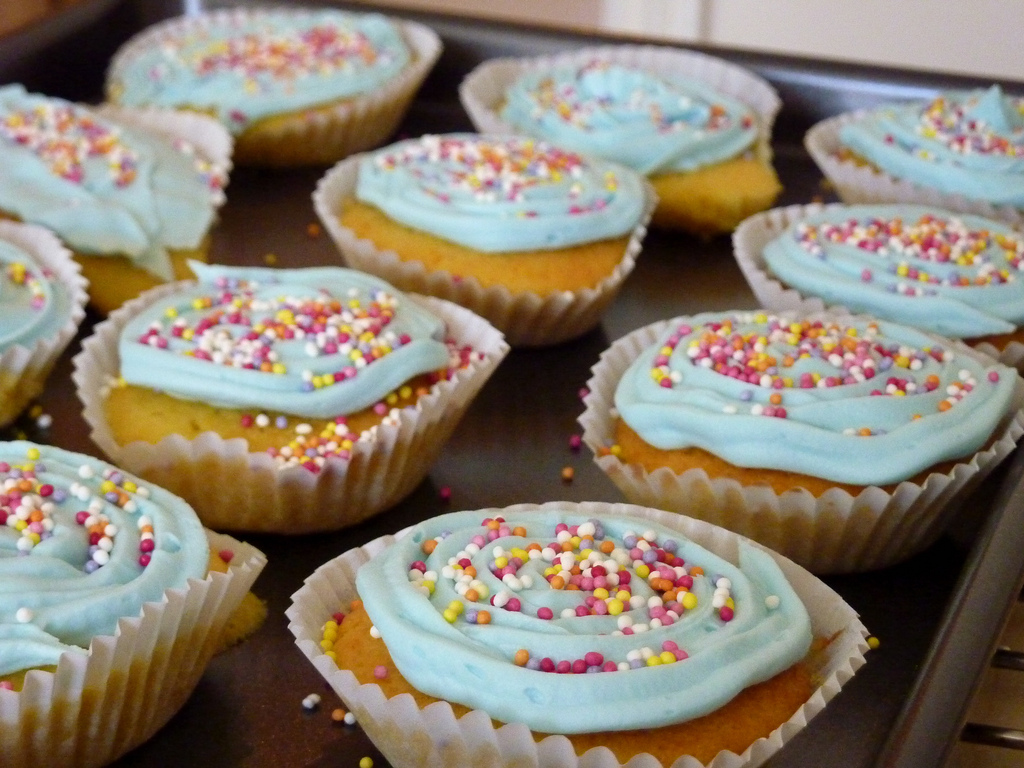
Most of my dessert recipes are made with fruit, but I also include the occasional cake, tart and, bien sûr, chocolate. Most French women would never dream of giving up sugar and desserts altogether. The question is, how to find a healthy balance so you can enjoy small pleasures while maintaining a healthy body and weight, neither feeling deprived nor going overboard.
I think a number of popular desserts are too sweet for health and enjoyment. I implore you to reconsider, for one illustrative seductress, the cupcake. I know: I am asking for a lot. It is entrenched in a lot of childhood memories. But the reality of most cupcakes’ unnecessary and excessive sweetness was brought home to me twice in the past year. (I am citing the cupcake but you can come up with apt alternatives that will bring the eat-with-your-head-as-well-as-your-senses mentality home.)
There’s a bakery in our Greenwich Village neighborhood in New York City that was made famous via the Sex and the City TV series. The series may be no more—though everywhere around the world in reruns—but the bakery is very much alive in the present with hordes of people lining up to buy its cupcakes. It is a very quaint little bakery on a charming tree-lined street, and it is nothing to see twenty or thirty people on line stretching around the corner to gain access to the privilege of purchasing one of these coveted treats. What is their magic? My husband grew up on cupcakes so once I bought him one of this store’s favorite “cakes” for his birthday. Surprise: he couldn’t finish it and did not enjoy it. He said it was so sweet it was what we call écoeurant (the extreme opposite of appetizing).
The second surprise came when I was passing by the shop early in the morning (before the lines) with a young foreign friend who wanted to take a picture of it. We talked with one of the staff to ask about the icing and coloring and he said, “You don’t want to know or you wouldn’t touch the stuff.” We explained that we had no intention of buying, even less eating them, but were just taking pictures for a New York photo album. Then he added, “The icing is bad enough, but the inside is just as bad.” (Now how’s that for a loyal and helpful employee? Or should I say former employee…)
The store is such a curiosity that I’ve also watched on many occasions, particularly on weekend afternoons, people emerging victorious after their twenty minutes on line with a cupcake or more and then devouring it in under two minutes (more like one minute) flat out, right there on the street outside the shop. Forget the pleasure factor; that’s not savoring or experiencing pleasure. That’s a quick fix. And what does that do to your body? I suspect you’ll be craving sweets for days. It surely sends the wrong message to your brain, and yet so many of us wonder about our cravings.
Enough studies have proved that sugary treats trigger mood swings tied to our soaring blood sugar levels and prime us for energy crashes followed by more cravings for sweets. What a vicious circle. Sweets are tough to walk away from, so it’s up to you to come up with the tricks that work for you: don’t walk by the pastry shops (that’s one of mine), don’t bring home more than a reasonable portion of dessert or you’ll eat the whole thing, avoid strange encounters of the sugary kind at work—walk away.
I prefer to celebrate desserts and the pleasures they bring (really) and not give a discourse on their evil ways. One of the things I have been implicitly highlighting, and now explicitly, is that desserts and other sweets should not exist often in isolation. Okay, an ice cream cone now and then is a pleasure not a crime. At the end of a meal laden with protein and varied food groups, a dessert is a perfect and healthy closure. Enjoy it. Just remember portion size and balance over a few days.
